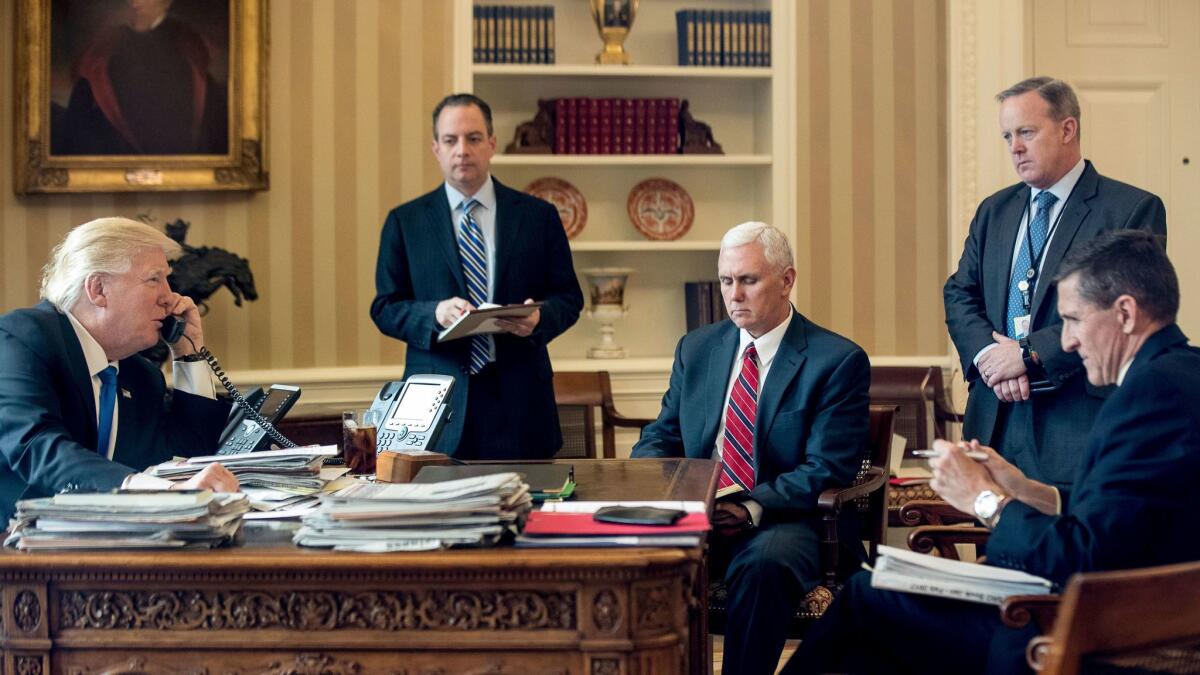No, Trump critics. It’s highly unlikely he has committed treason

The word is hurled like a thunderbolt: Treason!
There are few more serious charges than taking up the cause of America’s enemies and colluding to undermine the country from within.
Yet that very accusation has been leveled against President Trump by some of his most fevered critics. They cite, among the particulars, the president’s evident high regard for his Russian counterpart, Vladimir Putin, and Russia’s meddling in the 2016 election, which helped Trump and badly undermined Democrat Hillary Clinton.
It’s not just left-wing celebrities like film director Michael Moore who are wielding the T-word. Rep. Seth Moulton, a Massachusetts Democrat and Iraq war veteran, used it during a CNN interview.
“If members of the administration are essentially conspiring with Russia … that’s the definition of treason,” Moulton said. “This is a very, very serious affair.”
Trump and his top aides have emphatically denied any knowledge of Russia’s efforts to tilt the election, much less involvement. The president has repeatedly insisted he would have won the White House regardless and suggests the focus on Russian interference is a way of undercutting his administration.
“The whole Russian thing, that’s a ruse,” Trump said at last week’s frenetic news conference. “It’s a ruse.”
Casually tossing out political rhetoric is one thing, provocative as it may be. The laws that define treason are quite specific, however, making it unlikely in the extreme the accusations that Trump and his aides conspired against America will go anywhere beyond the purview of late-night comedians and the president’s hardest-core detractors.
What is treason?
It is the one crime that is spelled out in the Constitution. Article III, Section 3 states: “Treason against the United States, shall consist only in levying War against them, or in adhering to their Enemies, giving them Aid and Comfort.”
It is a distinct crime from others covered by law, such as sedition — inciting revolt against the government — or espionage.
What is the punishment for treason?
That was left up to Congress. Lawmakers decreed the mandatory minimum punishment would be five years in prison and a $10,000 fine. In the most egregious cases, the penalty is death.
Presumably the accusations against Trump et al don’t go to waging war against the United States but rather the matter of alleged “aid and comfort.”
Yes.
So what does the law say in that regard?
Offering aid and comfort covers a range of activities. Giving shelter to an enemy soldier or providing material assistance to a hostile government would be two examples. Merely sympathizing with a foreign government does not, in itself, constitute treason. The law requires a specific action to be undertaken.
How difficult is it to obtain a conviction?
Very. A guilty verdict requires either a confession in open court or the testimony of two witnesses “to the same overt act.”
How common are prosecutions for treason?
Rare. In the whole history of the country, there have only been a few dozen cases brought to trial. Less than half resulted in convictions.
Wasn’t Benedict Arnold convicted of treason?
Actually, no. Even though he is perhaps the most famous traitor in U.S. history, his collaboration with the British occurred during the Revolutionary War, before the Constitution was drafted.
Perhaps the most celebrated case of treason involved Aaron Burr, in 1807. In what was then known as the “Trial of the Century,” the former vice president was accused of waging war against his young country by allegedly seeking to entice western territories to break away and form their own nation.
President Jefferson helped direct the prosecution from the White House. Nonetheless, Burr was acquitted after a trial presided over by the Supreme Court’s chief justice, John Marshall.
Wow! Sensational stuff!
Indeed. And something we’re unlikely to see replicated anytime soon.
Tracking Trump: The first 100 days »
ALSO:
California’s Democrats are trying to harness a new wave of progressive energy
Bill Maher’s ‘Real Time’ interview with Milo Yiannopoulos fuels new criticism
Trump reverts to campaigning a month into his term. This time, his opponent is the media
More to Read
Get the L.A. Times Politics newsletter
Deeply reported insights into legislation, politics and policy from Sacramento, Washington and beyond. In your inbox three times per week.
You may occasionally receive promotional content from the Los Angeles Times.











